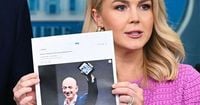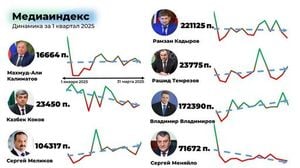The White House has sharply criticized Amazon for a reported plan to disclose the price impact of Donald Trump’s trade tariffs on its products, calling the move a "hostile" political act. This development comes amid rising tensions between the tech giant and the Trump administration, particularly as the latter has ramped up tariffs since re-entering office in January 2025.
Amazon had indicated to the Washington Post that it considered itemizing tariff costs for customers on Amazon Haul, a low-cost platform launched last year to compete with companies like Shein and Temu. However, the company quickly denied that such a plan was ever intended for its main e-commerce platform.
At a press conference marking the president's first 100 days in office, Press Secretary Karoline Leavitt expressed her discontent with Amazon’s reported actions. "This is a hostile and political act by Amazon," she stated. "Why didn’t Amazon do this when the Biden administration hiked inflation to the highest level in 40 years?" Leavitt’s remarks underscore the pressure the White House is facing regarding its new import taxes, which analysts warn could lead to increased consumer prices and even a recession.
Since Trump’s return to the presidency, he has imposed tariffs on foreign imports, which now carry new duties of at least 10%. Products from China, a significant supplier to the U.S. market, are facing even steeper import taxes of at least 145%. These measures have already resulted in a notable decline in trade between the two nations, raising concerns over potential supply shortages for everyday items ranging from baby strollers to umbrellas.
On April 29, 2025, Treasury Secretary Scott Bessent defended the administration's economic policies, asserting that trade negotiations with major partners are ongoing. However, he sidestepped inquiries regarding the status of talks with China, which was the U.S.'s third-largest source of imports last year, following the European Union and Mexico.
Despite Amazon's denial of any intention to implement tariff pricing on its primary site, the backlash from the White House suggests that the administration is keenly aware of the political ramifications of such a move. Leavitt noted that Amazon’s plan to detail the tariff impact was first reported by Punchbowl News, citing an anonymous source.
Amazon's spokesperson reiterated that the discussions surrounding tariff pricing were limited to Amazon Haul and had not been approved for the main site. The spokesperson stated, "The team that runs our ultra-low-cost Amazon Haul store has considered listing import charges on certain products. This was never a consideration for the main Amazon site, and nothing has been implemented on any Amazon properties." A follow-up statement indicated that the tariff pricing policy under consideration was ultimately rejected.
Leavitt was also pressed during the White House briefing about Bezos's support for Trump, especially considering Bezos had donated $1 million to the president’s inauguration and attended the event in January 2025. "I will not speak to the president’s relationships with Jeff Bezos, but I will tell you this is certainly a hostile political action by Amazon," she replied, emphasizing the administration's discontent.
In a pointed display of criticism, Leavitt held up a printed article that illustrated Bezos’s connection to China, highlighting a Reuters headline that read, “Amazon partners with China propaganda arm.” This article, published in 2021, discussed Amazon allegedly removing negative reviews of a book by Chinese President Xi Jinping. The context of this criticism is significant, as it reflects the increasingly fraught relationship between the tech giant and the current administration.
The tension between Trump and Bezos has been well-documented. The two have had a tumultuous relationship, with Trump often criticizing Amazon and the Washington Post, which Bezos owns. In 2019, Amazon even filed a lawsuit against the Pentagon, claiming it was denied a lucrative $10 billion contract due to Trump’s interference, alleging he pursued personal and political vendettas against Bezos.
Despite the ongoing tensions, Bezos has shown a willingness to engage with Trump. In December 2024, he met with the president at Mar-a-Lago, signaling a potential thaw in their relationship after years of public disputes. This meeting came shortly after Bezos's controversial decision to block the Post from endorsing Democratic candidate Kamala Harris during the 2024 election cycle, which led to subscriber losses and staff departures from the newspaper.
The fallout from Amazon’s tariff pricing proposal illustrates the broader implications of Trump’s trade policies and their impact on American consumers. As the administration continues to navigate its economic strategy amid rising inflation and trade tensions, the relationship between the White House and major corporations like Amazon will likely remain a focal point of political discourse.
As the situation unfolds, both the White House and Amazon will need to tread carefully to avoid further escalation. With consumers already feeling the pinch from rising prices, any additional measures that could exacerbate the cost of living will undoubtedly draw scrutiny from the public and lawmakers alike.




